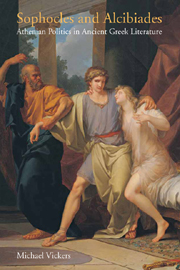Book contents
- Frontmatter
- Contents
- Preface
- 1 The mythologizing of history
- 2 Antigone, Pericles and Alcibiades
- 3 Oedipus Tyrannus, Alcibiades, Cleon and Aspasia
- 4 Ajax, Alcibiades and Andocides
- 5 Philoctetes, Alcibiades, Andocides and Pericles
- 6 Alcibiades in exile: Euripides' Cyclops
- 7 Oedipus at Colonus, Alcibiades and Critias
- 8 Critias and Alcibiades: Euripides' Bacchae
- 9 Alcibiades and Melos: Thucydides 5.84–116
- 10 Thucydides on tyrannicides: not a “digression”
- 11 Alcibiades and Persia (and more Thucydidean “digressions”)
- 12 Alcibiades and Critias in the Gorgias: Plato's “fine satire”
- Epilogue
- Bibliography
- Index locorum
- Index
6 - Alcibiades in exile: Euripides' Cyclops
- Frontmatter
- Contents
- Preface
- 1 The mythologizing of history
- 2 Antigone, Pericles and Alcibiades
- 3 Oedipus Tyrannus, Alcibiades, Cleon and Aspasia
- 4 Ajax, Alcibiades and Andocides
- 5 Philoctetes, Alcibiades, Andocides and Pericles
- 6 Alcibiades in exile: Euripides' Cyclops
- 7 Oedipus at Colonus, Alcibiades and Critias
- 8 Critias and Alcibiades: Euripides' Bacchae
- 9 Alcibiades and Melos: Thucydides 5.84–116
- 10 Thucydides on tyrannicides: not a “digression”
- 11 Alcibiades and Persia (and more Thucydidean “digressions”)
- 12 Alcibiades and Critias in the Gorgias: Plato's “fine satire”
- Epilogue
- Bibliography
- Index locorum
- Index
Summary
The role of Alcibiades in Athenian comedy was a commonplace in antiquity. Plutarch cites “the comic dramatists” as evidence for Alcibiades' powerful oratory (Plut. Alc. 10.4), and Libanius usefully poses the rhetorical question: “What play did not include [Alcibiades] among the cast of characters? Eupolis, Aristophanes, did they not show him on the stage? It is to him that comedy owed its success” (Lib. Fr. 50.2.21). I have discussed Alcibiades' role in Aristophanes' extant plays elsewhere; this book is concerned with his equally prominent role in the tragedies of his day. Indeed, we might well ask, “What tragedy of Sophocles did not include Alcibiades?” (Of the surviving plays, only Trachiniae and Electra, in fact, did not.)
Each tragic trilogy performed at a dramatic festival was rounded off by a satyric drama, the precise purpose of which is still obscure. It may have harked back to more traditional festival fare, of a kind performed before tragedy turned away from purely Dionysiac stories; it may have been intended to provide comic relief after the serious business of tragedy. But whatever its specific role, it can be shown – sometimes at least, for the evidence is extremely scanty – to have been no less political than tragedy. Euripides' Cyclops is no less imbued with Alcibiadean allusion than the Sophoclean plays we have discussed so far, and is of special interest because it reveals how another playwright who was somewhat more sympathetic towards Alcibiades dealt with the same situation, namely, issues arising from the debate surrounding Alcibiades' return from exile.
- Type
- Chapter
- Information
- Sophocles and AlcibiadesAthenian Politics in Ancient Greek Literature, pp. 82 - 94Publisher: Acumen PublishingPrint publication year: 2008



